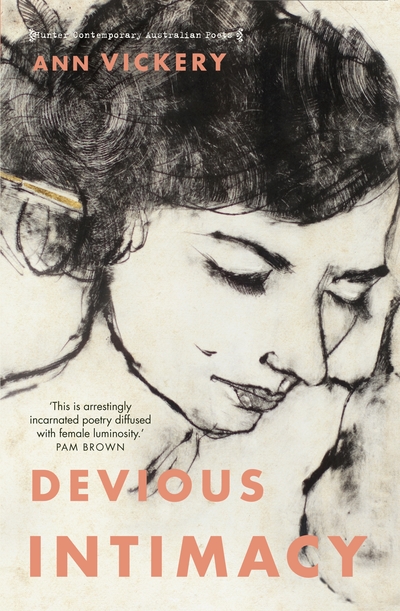
Devious Intimacy by Ann Vickery
Hunter Publishers, 2015
Small Town Soundtrack by Brendan Ryan
Hunter Publishers, 2015
These two recent volumes from the distinguished Hunter Contemporary Australian Poets series are about as different from each other as umeboshi and camembert, and – as I’ve found when wanting to impress Japanese visitors with a striking new taste combination that has the energy and disorder of a good poem (to cite Tom Shapcott’s useful terms) – such obverses delight with both surprise and recognition.
Anarchically centrifugal, barely staying still for a line, a phrase, let alone a haiku curlicue of ‘gander gossip’ or ‘polyblivion’, Ann Vickery’s magical poems in Devious Intimacy tease the gazing brains of their readers with non-sequiturs, frizzle-tops and virtuoso titillation: disjunct, disarray, dishevel, discontinue … Vickery’s virtuoso sleight of word camps grandly (see ‘Vivienne’).
Building on notions of the ‘trace’ Vickery has re-framed both ‘devious’ and ‘intimacy’ in these elusive/allusive/illusive, playfully and deadly serious poems. ‘A poem is a mirage of distillation’, she writes in ‘Ecopoetic Ecumenical’:
Purgatory is by nature hot and full of hoons. Temperature, not temperament, a nice set of wheels. It’s generally the assholes that get all the love poems.
This poem’s ‘bucket list of romance’ suggests both ‘razing the grapes’ and ‘Cling to a hundred little homilies’; though ‘love’s climate countdown / is inordinately inevitable. Terroir on tap.’ Vickery’s distilling has produced concentration, sculpting, pruning, (self-)conscious architecturing. The poet might be pretending disingenousness, but like Socrates, Joyce and Pam Brown, she is well in control of the reins.
Devious Intimacy is unceasingly interlocutory. The facing page’s ‘Edinburgh guard: fragment’ might be taking us through that ambiguous ‘Malley country’, a ‘thistle-fisted, / cento puff to full-ferried existence […] you fuck angels / on a Duino roof’. Suggestive and ambiguously threatening, like ‘Ecopoetic Ecumenical’ the poem ends in the underbelly: ‘unsexed terroir’. Where conventional syntax and logic are abandoned for something more ‘porphyrial’, the poetry multiplies and mystifies connotation, creating both anxiety (about not being able to define, pin down, axiomise) and delight (in multiple, juicy, dichotomous meaning-making). In both poems the last words are thematically significant.
After all (and echoing AD Hope?) ‘We are all gulags / aren’t we? Migratory cycles / of need, energy and failure of the body. / Listening only when the expected comes unstuck’ (‘Russian Bit Player’) and our passion is ‘moulted’ like mutton birds, ‘Starved at / the end-point of love’. In ‘Adventure at Sadies’:
Down the rabbit hole, we find a world of cottage cheese and over-inflated princedoms … conjecture convivially on the poet’s last fuck— ing stand
Suggesting that traditional fantasy narratives may be untrustworthy, Vickery’s poetry celebrates its predominant trope of bathos, elevated to new heights of critical insight: ‘What price Russian formalism? / How unusual can an everyday poem be?’ Linguistic juxtaposition is usually unsettlingly polysyllabic so, a few lines later, ‘Circularity breeds / stove-top despair, the coffee always spills twice’. Clearly this poem’s rejection of conventional poetic fluency, cadence and lyrical organicism is a kind of conversation with poet friends—some names are mentioned towards the end, bearing out Devious Intimacy’s epigraph: ‘Poems should echo and re-echo against each other.’









